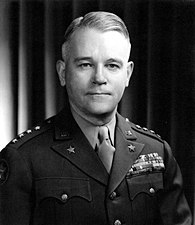Lawton Collins
| Joseph Lawton Collins | |
|---|---|
 |
|
| Nickname(s) | "Lightning Joe" |
| Born | May 1, 1896 New Orleans, Louisiana, United States |
| Died | September 12, 1987 (aged 91) Washington, D.C., United States |
| Buried | Arlington National Cemetery, Virginia, United States |
| Allegiance |
|
| Service/branch |
|
| Years of service | 1917–1956 |
| Rank |
|
| Unit |
|
| Commands held | 3rd Battalion, 22nd Infantry Regiment 3rd Battalion, 18th Infantry Regiment 25th Infantry Division VII Corps Vice Chief of Staff of the United States Army Chief of Staff of the United States Army |
| Battles/wars |
World War I World War II Korean War |
| Awards |
Army Distinguished Service Medal (4) Silver Star (2) Legion of Merit (3) |
| Relations |
James Lawton Collins (brother) Michael Collins (nephew) |
General Joseph "Lightning Joe" Lawton Collins (May 1, 1896 – September 12, 1987) was a senior United States Army officer who served in World War II and became Chief of Staff of the United States Army during the Korean War. During World War II, he served in both the Pacific and European Theaters of Operations (ETO), one of few senior American commanders to do so.
His elder brother, Major General James Lawton Collins, was also in the army. His nephew, Michael Collins, was the command module pilot on the Apollo 11 mission in 1969 that put the first two men on the Moon and would retire as a major general from the United States Air Force.
Collins was born in New Orleans, Louisiana, into a large Irish Catholic family on May 1, 1896. He entered the United States Military Academy (USMA) at West Point, New York in June 1913, at the age of 17, and graduated on April 20, 1917, exactly two weeks after the American entry into World War I, and shortly before his 21st birthday. Due to the outbreak of war, the graduation was several weeks early. He graduated 35th in his class of 139. Among those he graduated alongside were Matthew Ridgway, Mark W. Clark (who shared the same birthday as Collins and, as the two youngest cadets, were both known as the "class babies"), Bryant Moore, Ernest N. Harmon, William C. McMahon, Norman Cota, Laurence B. Keiser, William W. Eagles, William Kelly Harrison, Jr. and Frederick Augustus Irving. All of these men were, like Collins, destined to become general officers and later to achieve high rank in the army, with Ridgway, along with Collins, becoming Army Chief of Staff and Clark becoming a four-star general.
...
Wikipedia
